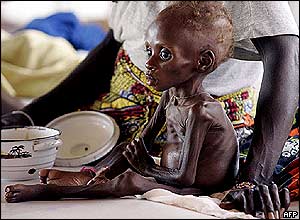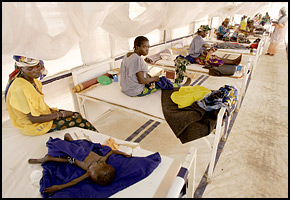il diario di un operatore della Croce Rossa, si puo' seguire qui:
http://news.bbc.co.uk/1/hi/world/africa/4720453.stm
Niger diary I: Arriving on the ground
Mark Snelling is a member of the British Red Cross Society's Emergency Response Unit in Niger.
Red Cross worker Mark Snelling
Mark Snelling says there is no time to lose if lives are to be saved
He has been keeping a diary for the BBC News website.
In the first entry he describes the team's journey to provide essential logistical support to the Red Cross relief response in the West African country, where up to 2.5 million people are now in urgent need of food.
Sunday 24 July
It's been an extraordinary few days. I get into work at British Red Cross headquarters on Thursday, preoccupied with the second wave of attempted bomb attacks in London.
My mind is not on unfolding emergencies elsewhere in the world. Then, quite unexpectedly, I'm asked if I'll go with the Emergency Response Unit to Niger.
The next few days are a frenetic round of briefings, vaccination appointments, personnel admin and shopping for supplies. And then we are off.
British Red Cross vehicles
This is an emergency that we and many others are responding to, right here and right now. The wider questions will have to wait
Q&A: Food crises and aid
The charter aircraft waiting for us at Bristol airport is an impressive old workhorse, an Antonov-12 built in 1968, complete with Ukrainian crew.
They busy themselves with prepping the plane as we get our two Landcruisers, packed with communications and administration equipment, up the ramp.
Five hours later, we land at a remote airfield in northern Algeria to refuel, something of a change from the chilly drizzle of Bristol.
As the doors open, the hot air hits us like a jet. It's 49C. The local security officials are anxious that we don't get out of the plane, but after some negotiation, they allow us to use the toilets.
What should have been a two-hour stopover turns into five. At this temperature, the pilots explain, it is simply too hot to start the engines.
We get under way only after the local fire brigade douses the engines and propellers several times with water.
At 0400 local time, we finally arrive. Niamey airport is closed, but a sleepy customs official processes our passports.
It feels like we've been travelling for days, but there's only time for a couple of hours' sleep before work needs to start.
Monday 25 July
We get into our makeshift operations base on Monday morning, a conference room in the offices of the Niger Red Cross.
We meet our local colleagues, together with international delegates from the Federation of Red Cross and Red Crescent Societies, who have already been here for two weeks doing the initial assessments.
Mothers and their undernourished children at a feeding centre run by MSF in Tahoua, northern Niger.
Locusts and a drought have meant that harvests have failed in Niger
They explain that a seed distribution is already under way to catch the end of the planting season.
As for the main operation, we have to move, and we have to move fast.
We know that if we don't prepare well, we will not be doing justice to the desperate needs here. But we also know that the clock is ticking. It's a fine line to tread.
Langdon Greenhalgh, the Federation team leader here, puts it well. "It's a question of building the ship and sailing it at the same time."
Our French Red Cross colleagues explain their plan for Zinder and Agadez, the districts where they are operating. The priority is to establish logistical bases from which they can run supplementary feeding centres.
"Why didn't the help get there sooner?" asks one journalist. There is no single easy answer
Food crisis timeline
It is agreed that we will adopt the same model for Tahoua and Maradi, which will be the focus of the British Red Cross. A plan is taking shape.
I go back to the airport with Peter Pearce, the British team leader, and Eric Rossi, a French Red Cross logistician attached to our six-person unit.
After quite a wait, our papers are processed and we get our vehicles and equipment out.
The next hours are spent getting the base up and running. Satellite phones are set up, computers and printers hooked up, local mobiles purchased.
Calls start pouring in from international media. Interviews range from the supportive to the slightly hostile.
"Why didn't the help get there sooner?" asks one journalist. There is no single easy answer.
One could say that government and UN strategies didn't work as well as they might have done; international donors were slow to respond despite aid agency warnings; it is also the case that it was hard to assess that a chronically deficient food situation was turning acute.
Of one thing I'm certain. It's easy to say that we should 'Make Poverty History'. It sounds good.
But there are huge changes that need to be made on every level - political, economic and humanitarian - before that can happen.
For the time being, though, this is an emergency that we and many others are responding to, right here and right now. The wider questions will have to wait.
Tuesday 26 July
Eric leaves this morning for Tahoua to get the rapid assessment done ahead of setting up the supplementary feeding centre there.
There is good news from the World Food Programme.
Some 4,000 tonnes of cereal and oils will be arriving next week. So we need to be ready to distribute.
NIGER IN FACTS AND FIGURES
Landlocked country in West Africa
One of poorest nations in world
Population of 11.5m
60% of population live on $1 a day
50% of population under 15
82% of population depend on subsistence farming
Source: UNDP
The Red Cross in Geneva has also found a European supplier to provide enough Unimix - an enriched flour that makes a kind of porridge - to distribute in Tahoua and Maradi.
Over the next six months, that will go to vulnerable children under five who need supplementary nutrition.
Their families will also receive a ration of rice, lentils and oil so that they do not end up dividing up what the child receives between themselves.
Neil Brown, another of our logisticians, is heading out to Maradi tomorrow morning and we're expecting another logistics co-ordinator and a nutritionist to arrive in Niamey today.
We've moved fast to get this far, and it's satisfying to see things fall into place. There's no time to lose.
|

